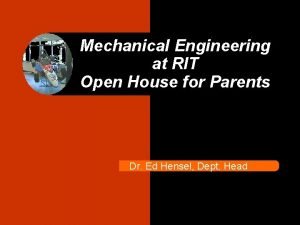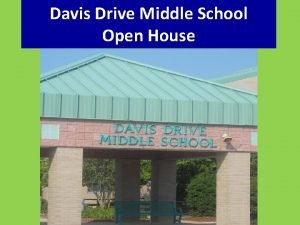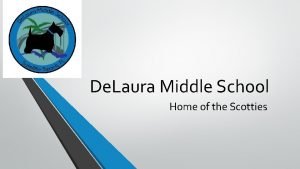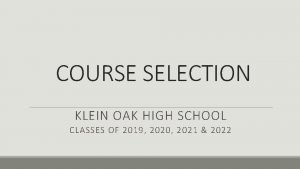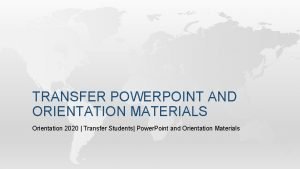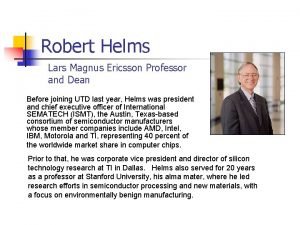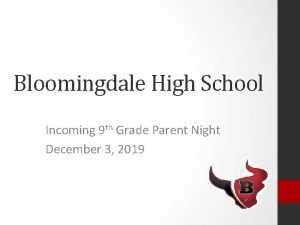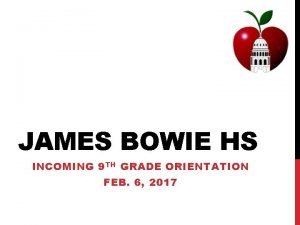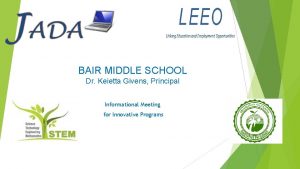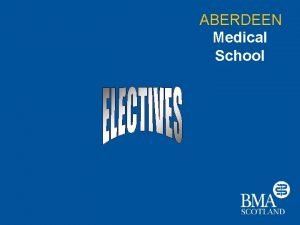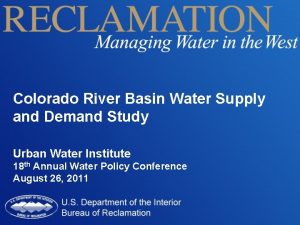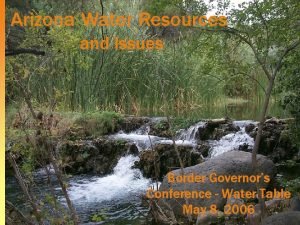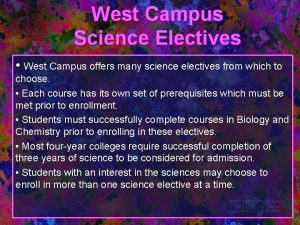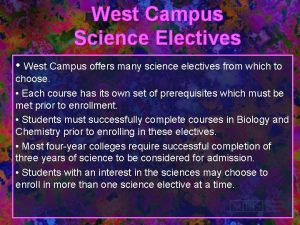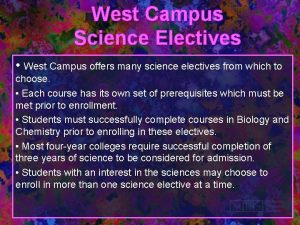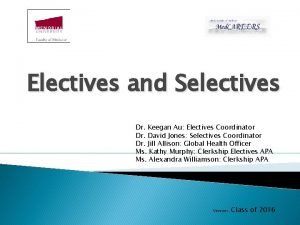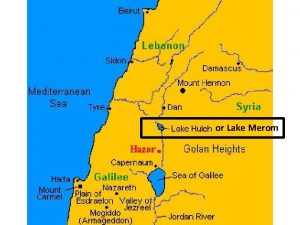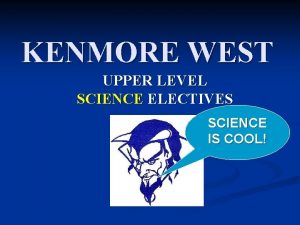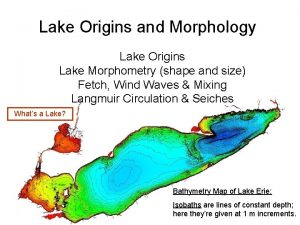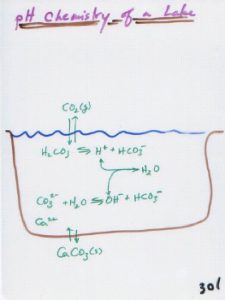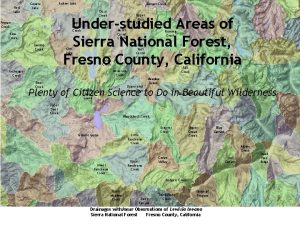Lake Zurich Science Electives Lake Zurich offers many
























- Slides: 24

Lake Zurich Science Electives Lake Zurich offers many science electives to students who have completed their core science coursework. Courses in a variety of scientific areas are available for students to enrich their understanding in the sciences. Each course has its own set of prerequisites which must be met prior to enrollment. Most four-year colleges require successful completion of three years of science to be considered for admission. Students with an interest in the sciences may choose to enroll in more than one science elective at a time.

Elective Courses AP Science General Sciences Anatomy and Physiology AP Biology Astronomy AP Chemistry Biology II AP Environmental Science Earth Science AP Physics 1 Environmental Science AP Physics C Applied Technology

Applied Technology Courses Principles of Robotics Advanced Robotics Intro to Engineering Design Advanced Engineering Senior Engineering Architecture Design Who should take one or all of these applied technology course? Students who enjoy working in a collaborative group on project based activities using innovative problem solving skills. BACK to Content Page

More about tech… Why take these courses? If you’re interested in the engineering/architecture/fabrication field take these classes to get a head start learning concepts that you will learn in college. Technology used: 3 D printers, laser cutter (to make parts for projects, Auto. Cad, Inventor, Solid Modeling, Revit 3 D Architecture Design, Vex Kits, Robot C. Engineering Tidbits: If you’re looking for something other than the traditional classroom this is the course for you. Academic Expectations: Complete assignments, Persistence, Willingness to innovate, Contributor to project with peer BACK to Content Page

AP Biology Why take this (course elective)? If you plan on any science/engineering/or health care field this is the class for you. By taking this course you will receive college credit – AP Credit from this course can earn up to 8 credit hours at most Illinois universities. This is a real representation of what a college classroom is like, class-time is focused on lab work, interpretation of data and refining critical thinking and laboratory skills. Who should take this (course elective)? Any sophomore, junior or senior who has taken one biology and chemistry class What topics will be covered in AP Biology? 4 Big Ideas: Evolution, Energy, Information and Interactions of Living Things BACK to Content Page

We Start at AUG Student Quotes: Even though I am not a Biology Major, I am thankful for AP Bio because it prepared me for every single on of my college courses. – Megan G. 2017 I feel way more prepared than every other student in my class. Caroline W. 2012 If you feel stressed out about this class I would be more than willing to come and visit with your students and tell them how thankful I was being one of your students. – Sarah (Nursing Student) 2015

Earth Science Why take this course? You should take Earth Science because it will fundamentally transform the way you see the world, Earth Science helps the land tell you stories. You should also take Earth Science because there is no better way to gain perspective on the fleetingness of life, it is actually a course in time. Who can take this course? Sophomores, Juniors, Seniors Are you curious about the environment, natural hazards, how our planet works or the history of the Earth? Do you want to know if Jurassic World could actually happen? Do you enjoy problem solving? Then take this class! Content/Topics covered: Oceanography, Astronomy, Earthquakes, Volcanoes, Evolution, Meteorology, Evolving planet BACK to Content Page

Save the Date: Earth Day Sunday, April 22. By taking Earth science you will learn about issues such as energy, meteorology, water and mineral resources, stewardship of the environment, oceanography, reducing natural hazards for society, planetary science and more! Shocking facts about the Earth It is estimated that 50% of all plants, animals, and birds will die off by the year 2100, with lead scientists calling the current loss of life, “The 6 th Extinction. ” (National Geographic) It is estimated that, by 2050, there will be no fish left in the ocean. (BBC) It is estimated that the surface of the Earth could rising in temperature between 2º and 6º by the end of the 21 st Century. (NASA. gov) BACK to Content Page

Anatomy and Physiology CP Human beings are arguably the most complex organisms on this planet. Imagine billions of microscopic parts, each with its own identity, working together in an organized manner for the benefit of the total being. Students will explore this phenomenon via experimentation and dissection using deductive reasoning and thought. Who should take this (course elective)? Students are encouraged to take this course as part of their overall fund of knowledge and for a better understanding of how their bodies are designed. This knowledge will help the student have a healthier lifestyle. However, this course will be very beneficial to those students seeking a future in health related fields. "The body is a bundle of careful compromises. " Randolph Nesse and George Williams BACK to Content Page

You know what get on my nerves? MYELIN Academic Expectations: Read, write, and speak effectively Demonstrate the ability to apply knowledge to complete tasks effectively Utilize critical thinking Enhance knowledge and skills with technology Curriculum Focus: The curriculum integrates the interdisciplinary study of the structures and functions of the human design at all levels. Areas of study include organization of the body; protection, support and movement; providing internal coordination and regulation; processing and transporting; and reproduction, growth and development. Whenever possible, careers related to medicine, research, health-care and modern medical technology are be emphasized throughout the curriculum. Case studies concerning diseases, disorders and ailments (i. e. real-life applications) are accentuated throughout the course. BACK to Content Page

Anatomy and Physiology Honors Why take this course? Interest in the human body. Interest in a health or medical career. Enjoy watching medical shows like the Good Doctor or Grey’s Anatomy. Who should take this course? Class is similar to college course, so those who are driven and self-motivated; willing to put in effort at a faster pace; and have successfully completed Honors Bio or Bio I with an A or teacher recommendation. Course description: An accelerated class in human anatomy and physiology. Learning about the body through various activities, labs, including dissections, and exposure to different careers in the health and medical fields. BACK to Content Page

It’s going TIBIA okay! Content/Topics Covered: Systems of the human body - parts & functions; open heart surgery; cadaver lab & kinesiology lab visit. 1 st Q – Intro to anatomical terms, tissues, integumentary system 2 nd Q – skeletal system, articulations & movements, muscular system 3 rd Q – nervous system & senses, blood cells/vessels/blood typing, circulatory system 4 th Q – respiratory system, digestive system, & reproduction/development Academic expectations: Accelerated pace. Attendance important. Strong work ethic. Similar to 1 st anatomy course at college level and use a college textbook. Students who take this course will learn about how their body is built and apply concepts to their body to make connections. “The human body is the most complex system ever created. The more we learn about it, the more appreciation we have about what a rich system it is. ” Bill Gates BACK to Content Page

AP Physics 1 Why take this course? Students will learn how and why the world and universe work as they do. Students will change how they think about their everyday life experiences. They will never drive down the highway, ride an elevator, or fly in an airplane without thinking about Physics. We’ll learn how to explain everyday phenomenon and impress family and friends with demos and fun facts. Topics Covered: How to describe motion (kinematics); why things move (dynamics); energy, work, and power; momentum and impulse; rotational motion; waves and sound; static electricity and dc circuits. BACK to Content Page

Physics is PHUN! Who should take this course? Sophomores, juniors, and seniors who have completed Algebra II. They should be prepared for a fast-paced yet supportive learning environment. Students are expected to learn through labs and modeling physical phenomena in different ways. Academic Expectations: Strong algebra and mathematical reasoning skills, strong reading comprehension skills, and a willingness and motivation to work diligently inside and outside of class to learn material. Students can expect a collaborative, group-based learning environment. BACK to Content Page

AP Physics 1 versus AP Physics C AP Physics 1 AP Physics C Algebra Based Calculus Based Mechanics, but with more complex models elaborating on topics learned in Physics 1 Electricity: electrostatics and DC circuits Electricity/ Magnetism and Electromagnetic Field Theory Waves and Sound Complex Circuits BACK to Content Page

AP Physics C Who should take this Course? • Students who are currently enrolled in AP Calculus AB or above • Students looking for exposure to a calculus based physics course • Students interested in learning about the rules that govern our universe Topics Covered: • AP Physics C covers both classical mechanics and Electricity and Magnetism. How is AP Physics C different from AP Physics 1? • We cover topics to a greater depth and use calculus to help analyze the situations. • We begin to develop our understanding of field theories. BACK to Content Page

Environmental Science Why take this Environmental Science? Students interested in potential careers regarding Environmental Science or Alternative Energy should take this course. In addition, any students interested in learning about the impact human interactions have on the environment may also find this course useful. Overall, if you are interested in the health and future of the natural world, Environmental Science will explore these issues. Who should take this (course elective)? Any student may take Environmental Science. Any student that needs to get a life science credit or is interested in Environmental Science should take this course. Content/Topics covered: Ecology, Pollution, Population Dynamics, Environmental Policy, Alternative Energy are a few of the topics covered, among many more. Course description in two sentences or less. Environmental Science is a class that will address many contemporary environmental issues and the impact these issues may have on the future health of the natural world. BACK to Content Page

AP Environmental Science This course is interdisciplinary involving the fields of ecology, biology, ocean and atmospheric sciences, climatology, chemistry, geology, physics, toxicology, geography, economics, politics, and ethics. It is designed to be the equivalent of a college introductory environmental science course; this includes the wide range of topics studied, the in depth, specificity and detail of course materials, and the amount of time spent studying material outside of class. Students who take this course will learn… About the many challenges that face us both locally and globally regarding the environment, our use of resources and how they can personally contribute to promoting sustainability regarding energy, agriculture, biodiversity, pollution, and resource consumption. Students will gain an appreciation for the earth and al that it provides for us. BACK to Content Page

Want to learn more about sustainable solutions to problems involving feeding a population of 7 billion, meeting the energy and resource needs of this growing population, disposing of waste including hazardous materials, providing clean water and air for future generations, climate change, and health issues caused by toxins in the environment then take this class. Content/Topics covered: Topics covered include climate and weather, evolution, biodiversity, population ecology, , community ecology, ecosystem ecology, ethics and economics of sustainable development, human populations, environmental policy, agriculture, land management, the urban environment, environmental health and toxicology, freshwater and marine water resources, conventional and renewable energy, air quality and pollution control, climate change, minerals and mining, managing our waste, and sustainable solutions. “There are two spiritual dangers in not owning a farm. One is the danger of supposing that breakfast comes from the grocery, and the other that heat comes from the furnace. ” ― Aldo Leopold, A Sand County Almanac BACK to Content Page

Astronomy Interested in learning about the heavens above? Need another science class where math is not the focus? Interested in science but not interested in taking any of the other sciences offered? Take this class. Content/Topics covered: History of Astronomy, Nature of light, Star formation, Galaxy formation, Nature of Universe Academic Expectations: Demonstrate an understanding of the principles underlying the phenomena Complete assignments on time Study for exams (multiple choice-essay) Participate in some evening observations as opportunities arise Students who take this course will learn how we know what we know about a place we can’t touch or visit and why the seasons exist. BACK to Content Page

Biology II Why take Biology II? Biology II is a course designed for the student who has an interest in life science which extends beyond Biology I. The goal of this course is to foster this interest through application of conceptual ideas to many advanced laboratory exercises in order to provide a thorough coverage of living things. Biology II will guide the student from the simplest unicellular organisms to those that are multi-cellular and more complex. By taking this course, the student will gain a true understanding and appreciation for the diversity of living organisms on Earth. Who should take Biology II? A student who would like another year of a life science course before trying an AP Science course A student who would like to add to or strengthen their understanding of the life sciences A student who would like to prepare for taking a life science course in college BACK to Content Page

Biology: The only science where multiplication and division means the same thing Content/Topics covered: Taxonomy (how living things on our planet are classified), Cytology (review of cell structure and function), Trip to Brookfield Zoo Study of Kingdoms of living things: (and viruses) Plant Kingdom Fungus Kingdom Protist Kingdom Animal Kingdom (with dissection) Bacteria Kingdoms Academic Expectations: In order to understand the diversity of life you will complete a variety of assignments. There will be eight main sections or units covered this year. Each section will contain notes, labs, quizzes, a unit test, projects, etc. BACK to Content Page

AP Chemistry Why take AP Chemistry? Ask yourself, “Do I want to go into science, engineering or health care? ” If you want to know more about advanced topics in Chemistry and how it applies to life and work in a technological society this is the class for you. Who should take AP Chemistry? AP Chemistry is specifically designed for students with a strong math background, a desire for developing problem solving skills, and those who wish to experience more in-depth, the concepts learned in their previous chemistry courses. Content/Topics covered: We will be covering 90% of the topics covered in a 1 st year College Chemistry course. Quotes: “Taking AP Chemistry made the transition from high school Chemistry to introductory university Chemistry seamless. Not only the content covered, but the expectation to be able to learn independently was a key component in the transition with not only chemistry but with university studies in general. “ “Bryan Smith” Class of 2011” BACK to Content Page

BACK to Content Page
 Hashim: what's your favorite subject
Hashim: what's your favorite subject Open electives rit
Open electives rit Davis drive middle
Davis drive middle Windermere high school principal
Windermere high school principal Sutter middle school website
Sutter middle school website Basha high graduation 2022
Basha high graduation 2022 Newsome high school electives
Newsome high school electives De laura middle school
De laura middle school Promise2purpose.net
Promise2purpose.net Carnage middle school electives
Carnage middle school electives Gdb restricted electives
Gdb restricted electives Cs guided electives utd
Cs guided electives utd Ucf psych advising
Ucf psych advising Dse english electives
Dse english electives Sunrise mountain high school graduation 2021
Sunrise mountain high school graduation 2021 Bloomingdale high school staff
Bloomingdale high school staff Ee electives kfupm
Ee electives kfupm Bowie high school electives
Bowie high school electives Gbs electives
Gbs electives Delaura middle school electives
Delaura middle school electives Anu gdlp
Anu gdlp Aberdeen electives
Aberdeen electives Oligotrophic vs eutrophic
Oligotrophic vs eutrophic Lake powell and lake mead
Lake powell and lake mead Lake powell and lake mead
Lake powell and lake mead

